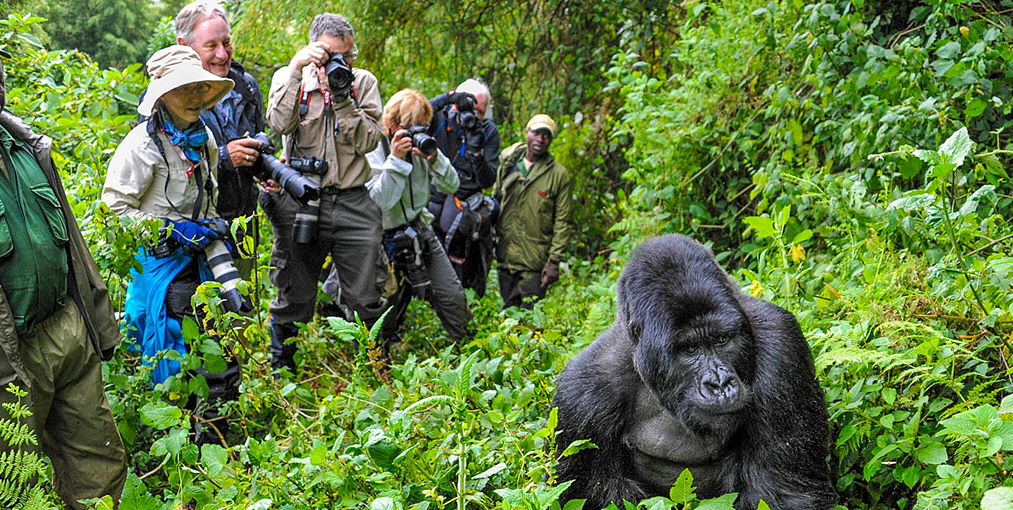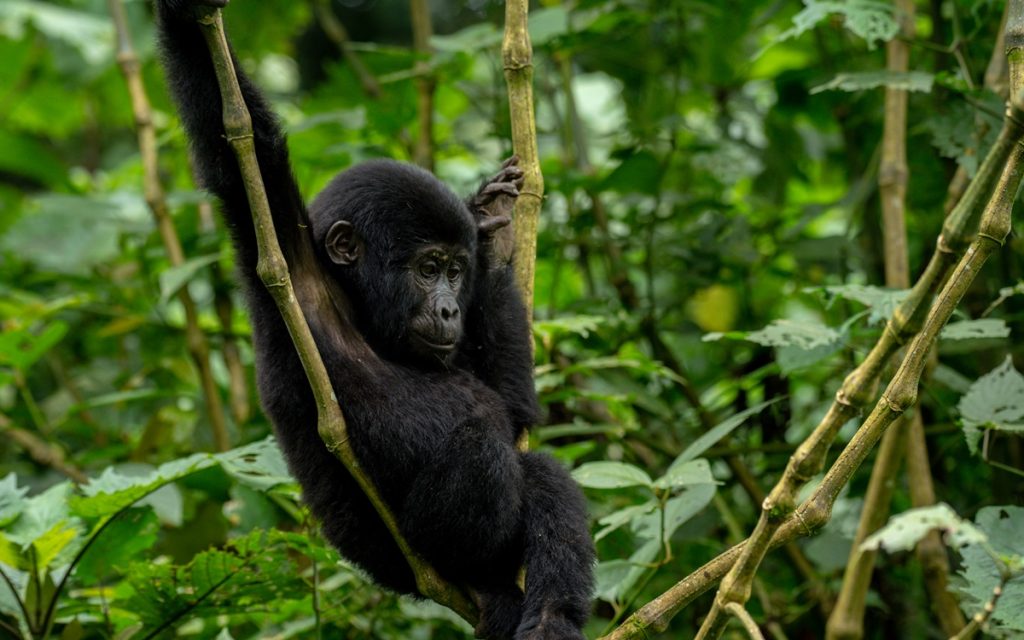- Written by: Anthony
- June 24, 2025
Why Do Gorillas Beat Their Chest?
Why Do Gorillas Beat Their Chest?
The forest holds its breath. A soft rustle, a thump, then another—deep and hollow like distant drums echoing through mist. You pause. And there he is. Silverback. Upright. Broad. Calm, but charged. Then suddenly—boom boom boom! He beats his chest with cupped hands, the sound carrying through the thick air like thunder without lightning.
If you’re lucky enough to witness this, you don’t forget it. But you may ask yourself the question, why do gorillas beat their chest?
Contrary to what the movies may have taught us, chest-beating isn’t a sign of rage. It’s an act that silverback gorillas display whenever they want to assert dominance. When a silverback rises and drums his chest, he’s sending a message:

A male silverback beats his chest
“I’m here. I’m strong. I’m watching.” It isn’t necessarily to intimidate but, to guide.
In the gorilla world, posture and rhythm speak louder than roars. It’s a form of non-violent communication, especially when rival males are feeding or living nearby.
Instead of a charge into a fight, a silverback can let his body do the talking. The chest beats might save a battle before it starts.
When a gorilla beats his chest, the noise can travel more than a kilometre across the forest. The secret? He beats with cupped hands, creating a resonating, drum-like boom that bounces through the canopy. It tells other males to stay clear—and sometimes it’s an irresistible draw for females in the area.
Think of it as a personal soundtrack. One that says, “This is my space.”
Beyond just asserting dominance, sometimes gorilla beat their chest if they want to display visual and acoustic signal of their fitness level as a potential mate. Female may use this display to assess the future father of their babies.
Suggested Safari Itineraries
14-Day Uganda, Congo & Rwanda Gorilla Trekking & Wildlife Safari
$ 4900
per personIt Starts Young, But Gets Serious
Young gorillas begin practicing the art of chest beating early in life. At first, it’s just play. But as they grow, it becomes something else—a tool for dominance, flirting, or showing confidence. Mature males develop a special air sac near their larynx that helps amplify the sound, making each beat unmistakable in its intent.
Not Just Silverbacks
Though it’s most dramatic when done by the silverback, females and juveniles also beat their chests. For them, it might mean playfulness, surprise, or even mild protest. In every case, it’s an expression. A sound that marks identity and emotion.
Imagine experiencing the gorilla chest beat by a mature silverback during your gorilla trekking encounter with friendly gorillas, this can be more rewarding than you expect.
Recommended Safaris
Why do gorillas slap the ground?
When a gorilla slaps the ground, it’s not just noise—it’s a message. To a stranger wandering too close, it says “Back off.” To another troop across the valley, it might mean “We see you.” And to younger males eyeing leadership—it’s a reminder of who still holds the crown.
Sometimes it happens after a chest beat, like punctuation at the end of a sentence. Other times, it’s part of a bigger performance—running sideways, ripping leaves, thumping the earth—all wrapped in a rhythm of power and pride.
And the group? They don’t panic. They understand it. Every ground slap sends ripples through their social world, reinforcing respect, reminding roles, keeping the balance.
It’s not aggression for aggression’s sake. It’s wild diplomacy, gorilla-style.

A group of gorillas beating their chest
Do female gorillas also beat their chest?
Yes, even female gorillas do beat their chest if they want to assertdominance in the presence of a group they may be in.
Planning Your Encounter?
At Friendly Gorillas, we’ve guided thousands of first-timers into the heart of gorilla country. Whether you’re tracking families deep in Bwindi or watching a silverback claim his hilltop, your journey is carefully paced, ethically guided, and soul-deep.
Would you like to hear that chest-beat echo in your own bones?
Anthony

Ready for your ultimate wildlife experience?
Chat with us, our team is always here to help!
You may also like …

Got any questions
about traveling to Uganda?
Get in touch.








